EPISODE 207: MEANWHILE, IN PHOENIX
POP CULTURE SPIRIT WOW
Are you tired of “Here’s How the Oscar Catastrophe Went Down” play-by-plays yet? I know I should be, it’s really not that big a mystery, a guy screwed up, but for some reason I am not yet sated.
Actually, I much prefer all the "no but this is what happened"s to the think pieces about the moment, Richard Brody calling it “the most spectacular Freudian slip in its history” or Anthony Lane writing, “I prefer to read the entire foul-up as a stirring demonstration of togetherness. In this sundered and suffering world, why not cut out the losers completely and double the number of winners—white plus black, straight plus gay, Los Angeles plus Miami, and a box office of more than three hundred and seventy million dollars, for Damien Chazelle’s film, plus a discerning twenty-two million for Barry Jenkins’s “Moonlight?”
I mean yes, I was touched by the alacrity and generosity with which “La La Land” producer Jordan Horowitz responded, and I do like the idea that in a divided world the Oscars ended with a show of people embracing one another against their own interests.
It’s just, the section of me brain RAM reserved for politics and/or think pieces is a wee bit full, America. I can do detective stories about now-unemployed employees of Price Waterhouse Cooper, but that’s about it. Try to be more gentle. ++ There was one “hot take” on the Oscar disaster that did grab me. Noting the clear parallels to the election (so glad we get to keep reliving that in different ways), Adam Gopnik of the New Yorker posited that perhaps we are in fact living in the Matrix. How else to explain these weird glitches, he asks, then to realize that in fact we’re part of some experiment being undertaken by other beings. Because what else could it be?
It’s a crazy disturbing piece, made moreso because Gopnik really does seem to be entertaining the idea; he even brings in the strange ending to the Super Bowl as further evidence. But there’s one takeaway that I really like – all these crazy things that could not ever happen but then just did are like a spotlight on reality, alerting us to the fact that hey, you know how you think some things are crazy and can not ever happen? Well, um, yeah, actually they can.
Yes, that means that awful things can happen. But it also means that so can radically ridiculous dreams of joy. The odds are just odds, and as Han Solo says, Don’t tell me them. (A statement I much prefer to his more recent gem, “Oh my God, watch out, that’s a plane.”)
So go ahead and take the blue pill, Gopnik. I choose red. I think we actually just learned we’re way more free.

++
I used an Emoji the other day in an email to a friend who is also kind of a business associate. I did it thinking I’m very late to the emoji bandwagon and need to get onboard. Not only my nephews and nieces but lots of folks I know out here seem to speak emoji with such facility that it’s clear there is a language here that I do not understand. My go-to move has been to respond in as incoherent a manner as I can, thinking if I’m going to look ridiculous no matter what I might as well wear it.
But, much like Ben Franklin, I’m always trying to get better. If that looks like a smiley face, ice cream cone and dancing woman, so be it.
After hitting send, though, I was surprised to find I felt I had embarrassed myself a little bit. I’m a 47 year old man, writing to a business colleague and tacking on the visual equivalent of babytalk.
When “LOL” became a thing – and I thank God every day that linguistic catastrophe has passed – I simply refused to use it. It felt false and idiotic, and not in the adorable way. I don’t know where the abbreviation came from (yeah I do, it was the Devil), but for me it was an approximation not of laughter but insanity, starting with the fact that it was all caps. If you ever said to yourself, you know, “LOL” sounds sort of familiar somehow, it’s because it’s what deranged people say all the time.
After my momentary attempt at what all the cool kids (aka people younger than me) are doing, I think I’ve decided emoji are much the same. Perhaps it’s just that I’ve crossed some invisible age bridge which was then detonated like a Snapchat message which I also cannot understand behind me. All I can do now is live on other side, wondering crankily what the hell is wrong with everybody.
But you know, if I’ve learned anything in twenty five years living in the company of many men older than my father, it’s that cranky curmudgeon can be a pretty satisfying character. So keep your emojis out of my twitter feed, damn it, and take off your hat. ++ My intention for today was to write about monster movies, but it’s been sort of an adventure of a week. So instead I thought I would give you an edited version of the fruit of some of that labor. I was invited by Brophy Prep in Phoenix to kick off their Annual summit on Human Dignity with a homily and a talk on being a faithful citizen in the midst of whatever you want to call this thing that we’ve got going on over here but that again could also mean that we are way more free than we give ourselves credit for (red pill red pill red pill).
Me being me, I decided to avoid the question entirely and talk instead about pop culture and other resources which might nourish/save us though we walk through this valley of darkness. I also talked way too long and so posting a re-edited version here might perhaps slightly be a way of making myself feel like I am still capable of learning something as long as it is not how to use something stupid like “winky face”.
(I will say, despite being trapped on gymnasium bleachers for an hour, the students were amazing listeners. Hilarious ones, too: any time I tried to be funny they would offer an explosion of applause that very much said, “Good for you. Thanks for trying.”)
And speaking of monsters, we're back to them next week. (Go see “Logan”.)
(Also, thanks to those who sent me stories of their own childhood versions of monsters and/or those of their children. If anyone else has stories like they’d like to share, I would love to collect and post them. I don't know about anyone else, but hearing other people’s childhood fears somehow makes me feel better.) ++
RESOURCES FOR THE IMAGINATION
WHEN THE LEECHES ARE EATING AWAY YOUR MIND
I LANDSCAPING
I work as a freelance magazine and screenwriter. Or, as my Jesuit community likes to put it, early retirement. (“When are you going to get a job?” one older Jesuit said to me recently. “Um, I do have a job. I write for America,” I told him. “Ah, I don’t read that.” he said. Jesuits: See how they love one another.)
Still, I don’t exactly help my situation by working at Starbucks. I don’t what it is, but somehow the distraction of the music and the Starbucks clientele really helps me write.
Sometimes when I’m there I’ll pull away from whatever imaginative wormhole I’ve been sucked down into and suddenly for the first time I actually see the people around me. The guy in the back on his computer who has to have the shades down. The older guy in the nice shirt who’s always there reading his newspapers. The girls studying.
There we all are, total strangers to each other. And yet, on another level, we almost certainly have a lot in common. Some of us probably like the same bands or TV shows; we’ve been to the same places, or maybe share the same religion. Maybe as we’re sitting there some of us are even thinking about the same things.
“Landscape” is the word we use to talk about our surroundings, the physical context in which we live. But as a community, whether that’s the community of Phoenix or the US or the world, we travel on an imaginative landscape, too – ideas and events and memes and stories and figures through which we make sense of ourselves and the world.
Sometimes when I’m at Starbucks I try to imagine what that; it’s like my own version of Pokemon Go, uncovering another layer of reality that sits all around us, but hidden. Like if we could see clearly, maybe we’d discover that the capitol of our nation is actually Star Wars, which begins with the Death Star in Los Angeles but over the last forty year has kept extending out further and further. And maybe the schools in our country are all magical boarding schools, and Kanye and Tom Brady are on Mount Rushmore. And instead of a president we have a queen, and her name is Bey.

And maybe our roads are social media networks and gaming systems. Instead of tolls they take information from you and sell them to billboard companies all along the roads. (And it’s weird, because most of the ads still don’t seem to fit us.) And some of the roads are constantly disappearing, because they’re run by Snapchat. (On the upside, only young people can figure out how to travel along them in the first place, so they’re a lot more fun.)
Beneath the surface, there’s such a rich landscape that we’re all traveling and share, an ever-evolving terrain of symbol and story and meaning making.
Or so it used to be. Lately, I don’t know... No matter where I turn, it seems like every corner of the landscape is being overrun by our political situation, so much so that there are fewer and fewer cities of the imagination for us to escape to or wander in. Google Sweden and the top hits are not the incredible social safety net there, the fact they get five weeks of vacation and eat yogurt with flavors like gingerbread, mango cardamon and blueberry cinnamon, it’s fake news and refugees. Sunday night when they screwed up the Oscars, it was like November 8th, Day 2.

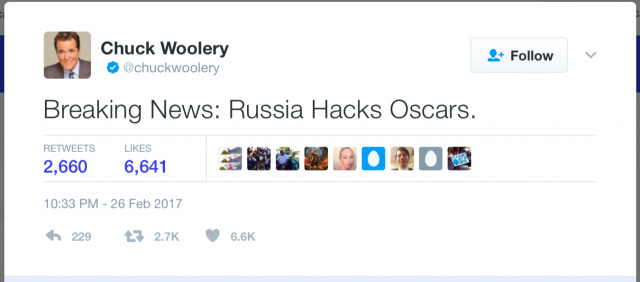

Even pet photos – the one thing we can always can count on – is not exempt from political creep.

Today every site is a news commentary site, every feed is a political feed, every event a statement and every person you meet a likely partisan who we fear at any moment may be about to do their latest five minutes on a topic we’re all sick of hearing about.
As a priest, I can feel it at Mass. Want to make a parish congregation tune out -- this is a topic I realize that we priests need no training in, it’s one of our super powers, but if you wanted to level up – just mention the president (or any of his opponents) by name, or any topic even potentially related to them (like, um, “the poor”). And it doesn’t matter whether those listening support or oppose, you can literally hear the air go out of the room, feel people check out in frustration. It’s the adult version of making babies cry.
How are all of us supposed to make it through four years of this (or tomorrow – please, tell me, how do I get through tomorrow? Someone, please come down here and hold me.)? How do we figure out what’s even important or how to feel when we’re constantly being battered by just one thing over and over, at the dinner table, at school, online, at the movies?
Not, I think, by giving into the cynicism and the banter and the constant arguing, or society’s insistence that every conversation begin and end with something about politics. Honestly, I try not to say the name of the President or anyone else political right now, simply because it immediately puts everyone on the defensive. It makes people take sides, and other than on a plate next to my hamburger, how are sides helpful?
No, I think the only way we make it through this with any degree of mental health and possibility is by resisting those temptations, and looking up to see the resources for our battered humanity that sit all around us.
If I can use a Lord of the Rings metaphor, I want to be like the Elves – the chubbier, schlubbier Elves – and offer a couple things you might be able to put in your knapsack for the journey ahead. No swords –more than enough of those already, sadly –but maybe a strong rope and a warm cloak and some tasty lembas to help us recover some sense of who we are and what we’re about.
II POPE CULTURE
So how do we feed and free our imagination at this time when everything all around us seems to be getting painted in one of those awful bright colors that scientists say is the exact right shade to drive people crazy? Where can we find resources of nourishment and challenge? Where can the loving and compassionate face of Christ be freed of the masks we all try to force on him, and be seen and heard for who he is?
For me, a good place to start is this guy:
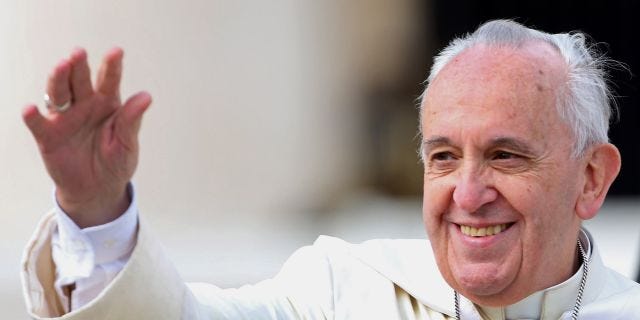
People have lots of hot takes on what has made Pope Francis stand out so much. It’s his commitment to the desperate.

The mourning.

The often overlooked.

It’s his smile, the way he is with kids...

...and the way they are with him.

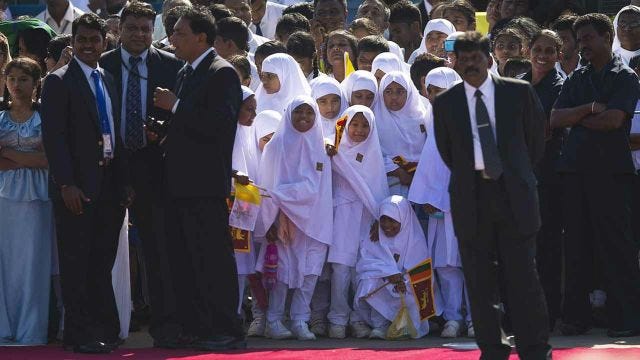
It’s the fact that basically he’s like the world’s favorite grandpa...

...right down to his willingness to laugh at himself.

Those things are all true. But what has been most striking for me about Pope Francis is his intuitive understanding of the power of the visual image to nourish and challenge our imaginations.
It sounds crazy, but it’s true -- everything that we see around us, this school and Ignatian spirituality and our commitment to education and social justice, began with a guy daydreaming. (The next time a teacher asks you why you’re not paying attention, you can tell them, Actually, teach, I’m starting a movement that’s going to change the world.
Then, after you’re given a JUG, you can at least take comfort in the fact that you really earned it.)
Ignatius learned what he most wanted convalescing in bed after battle, imagining himself sometimes the soldier saving damsels, sometimes a disciple or saint. And in the process he discovered the Bible isn’t just some collection of books that Catholics are supposed to know. It was Netflix before there was Netflix, every story a whole world that we can let play out in our imaginations like the best movie, or like a video game, us picking a character like Peter or Jesus and making our own choices. (Jesus, by the way, invented the respawn.)
Ignatius’ experience showed him, if people try that, if you step into a story, whether in first person mode or third person watcher, all kinds of interesting things can happen. Our hearts will be touched.
Pope Francis doesn’t go to the movies and he doesn’t play video games. He apparently hasn’t seen a TV show since 1990. (Which just goes to show that even the Pope is not perfect.)
But trained as a Jesuit, he sees that our world is filled with images and icons and stories trying to engage us in exactly the way Ignatius imagined, and so that we are primed for that kind of visual spiritual experience. And as a result I think he’s made a part of his papacy not just speaking the Gospel but being a public enactment of it. Over and over he puts himself in positions where everyone watching him – and at any one time that could be millions of people – can each have their own little moment of contemplation, of invitation and question.


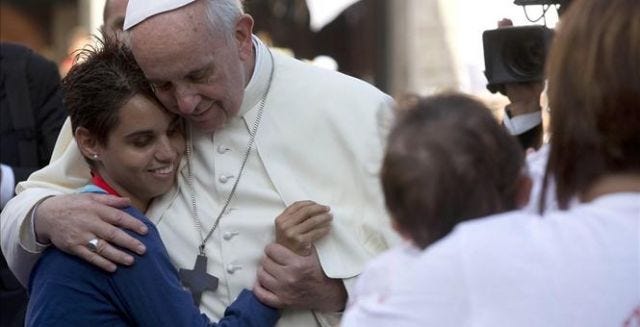


In the last four or five months, we’ve heard so little about the Pope. But that’s because of the political creep. He’s still out there doing his thing, and just a moment on Google can help bring us back to a moment that feeds us.

III POP CULTURE
There was a lot of Oscar buzz this year about the number of films and actors nominated who are not white or that were interested in other cultures. More than a quarter of the acting nominees in fact were either black or of Indian descent. Of the nine films nominated for best picture, four focused on the lives of people who were not white. Three had female protagonists – in fact 29% of movie tickets sold last year were to films led by women. (It shows you just how far we have to go to realize that is actually a big deal.)
But if you ask me, the real story of this year Oscar’s was not race but empathy. So many of these films explored the lives of unlikable or unseen characters– a surly Philadelphia garbage man and his loving wife; a weird New England misanthrope; a Miami kid trying to figure out his sexual identity; a Seventh Day Adventist who served in the U.S military as a conscientious objector; the black women no one ever knew about it who were at the heart of our space program.
Sunday night Viola Davis said in her acceptance speech for “Fences” that acting is “the profession that celebrates what it means to live a life.” Actually, so much of pop culture is about giving us a window into other people’s lives, helping us see and appreciate people we’ve ignored or overlooked, and to look upon one another with more compassion. Harry Potter was a great adventure series, but at its heart it was the belief that everyone deserves more credit and attention than we give them. That judging people to be villains is usually wrong and always too easy.
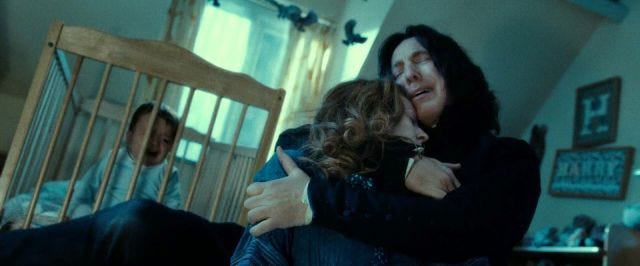
Or “Star Wars”, which again and again are about the risk and power of mercy. It’s interesting: in the original trilogy, wisdom figures Ben and Yoda insist that Luke’s desire to save Vader is THE WORST idea, literally. Do that, they tell him, and all is lost.
And, in this one point – which turns out to be the most important point – they are ABSOLUTELY WRONG. Had Luke followed their advice and straight up saber slashed his dad, yeah, he’d have been dead, but then no one would have been able to stop the Emperor. They’d have won the battle and lost the war.
What allowed Luke to see things so differently? It could be a lot of things, but I think it was that experience in the swamp of seeing within Darth Vader’s helmet his own face.

That’s the transformative power of empathy (and of pop culture). When we see through another’s eyes, our hearts are changed.
It’s not a coincidence that the heart of Judaism and of Christianity is a book of stories. The Bible was pop culture. And if we take the time to savor them, to let them speak to our hearts, the stories we love, whether spoken, sung, drawn or screened are there for us as a source of empathy and liberation.
IV THE WORLD
Have you ever taken a journey down the Google rabbit hole -- you search for the episode list of The Flash and then three hours later your face is covered in drool but you know everything there is to know about Glee, Canada, walnuts and the Mezozoic Era?
Here’s one rabbit hole I went down the other day: Did you know, it’s theoretically probable that there are molecules or atoms that are trillions of miles apart and yet somehow share a connection on some supersubatomic level. (That’s the official scientific term, “supersubatomic”. Sorry, physics teachers.) And that connection is so significant, it could become the basis for communicating – or even teleporting – across the whole universe. And it’s already super important in computing.
Speaking of computers and transportation, did you know the computers used to get people to the moon had less computing power than your calculator? The Apollo Guidance Computer had 64kbs of memory. That’s about ten times less than a PDF. It couldn’t even hold the Word document for this talk.
And speaking of space travel, last week we discovered a star not that far away which has seven Earth-like planets around it.

The star is called Trappist-1 – which as a Jesuit I am FURIOUS about, although I assume those planets are going to produce the universe’s most wicked jams and beers.

Brewed with gamma rays!
NASA has officially added the star system to its “Exoplanet Travel Bureau”, which I swear is an actual NASA-produced website set up to look like an interstellar travel bureau. They have descriptions of what it would be like to travel to different star systems, including fantastic drawing of what it will be like to visit there.

There are also poems, short stories, graphic novels and God is NASA cool.
A second trip down the rabbit hole:
Did you know, the color TV was invented in Mexico City? Guillermo Gonzalez Camarena designed the first color TV in 1941, when he was 17 and in high school. (What life-changing devices have you invented?)

One of the great early classics of color television, the Charlie Brown Christmas Special, based on the comic strip by Charles Schulz, also has an unexpected connection to Mexico. The only person Schulz would let animate his characters for that special and the forty years after that was Bill Melendez, who came to the U.S. from Hermosillo, Mexico as a child.
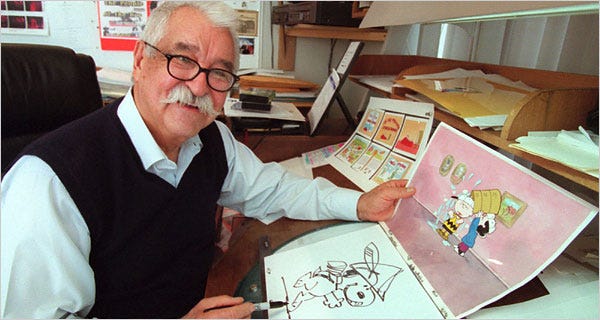
“Undocumented” wasn’t really a concept that they used then, you don’t even see it mentioned in his bio, but it seems pretty clear his mother brought he and his brother without papers. She wanted them to have a better education. And without him, Charlie Brown would have looked like this.

"A Charlie Brown Christmas" would have been the scariest cartoon ever. You would still be having nightmares about it.
And speaking of animation, there probably wouldn’t be a Disney movies or Disneyland if not for Margaret J. Winkler, an immigrant woman from Hungary who had worked her way up from being the secretary of Harry Warner – of Warner Brothers – to her own company, that produced and “found” a whole bunch of important animators. She mentored Disney even after he started his own film studio.

You’re probably wondering where I’m going with this. Give me one more, about Brophy. (And I know I’m now treading on dangerous territory and probably telling you things you already know, so I apologize. Now hush and listen.)
As I understand it from Wikipedia (and therefore it must be true), Brophy did not start as a school of its own, but was rather an offshoot of St. Mary’s High School. Not only that, but when Brophy was forced to close in the mid-30s because of financial issues, the women of St. Mary’s took the students in. They stayed like that for 17 years, until 1952. In fact, the presence of the Brophy men at St. Mary’s continues; that’s why their colors are green and white.

William Henry Brophy, whose wife gave the money that began this school, is interesting, too. He was also an immigrant, from Ireland. His parents died young; he was raised by his grandmother. He came to Arizona in 1881, at age 19, and got into mining and then banking. His company the Bank of Bisbee was one of the most important early banks and mining backers in the state.
And that tiny near-border town of Bisbee was also involved in an extraordinary labor dispute during Brophy's lifetime. In 1917 1300 miners were rounded up at gun point by a posse of 2200 deputized citizens – what is claimed to be the largest posse ever in the history of the United States -- and “deported” from Arizona because they were protesting for better pay and living/work conditions. The men were rounded up in a baseball stadium, put on cattle cars and deported to Hermanas, New Mexico, a sixteen hour trip by train without food or water in mid-90s weather and in cars that were mostly covered in manure.
For months after that anyone trying to come or go from the town of Bisbee needed to have a passport issued by the Sheriff; everyone who lived in town was interrogated by the “Citizens Protective League” to see where they stood on unions and the war, and if they didn’t answer correctly, they, too, were deported and/or threatened with lynching.
Eventually the Arizona Attorney General stepped in and told them this had to stop, this was illegal. The Sheriff said this: “Perhaps everything that I did wasn't legal....It became a question of 'Are you American, or are you not?'" He told the Attorney General: "I would repeat the operation any time I find my own people endangered by a mob composed of eighty percent aliens and enemies of my Government.
That was almost exactly 100 years ago.
Why am I telling you all this (and after you’ve been sitting for so long?) First, because no matter what’s going on around us right now, no matter how ordinary or bland everything seems, the fact is, the world is really really interesting.
A couple years ago on Conan Louis C.K. said,“We live in an amazing amazing world and it’s wasted...This is what people are like now, they’ve got their phone and they’re like *complaining voice* ‘Ugh..it won’t...’
“GIVE IT A SECOND. It’s going to space! Can you give it a second to get back from space?
Or listening to someone complaining about a flight delay, he says: “Oh really, what happened next? Did you fly through the air incredibly, like A BIRD. Did you partake in the miracle of human flight? You’re FLYING. It’s AMAZING. Everyone on every plane should just constantly be going ‘OH MY GOD, WOW!’”
If we stop and just take a minute to look at the world, to really see it, it will make us go OH MY GOD, WOW. It is the greatest resource for our imaginations.
Second, everything around us was built by so many people and events that we don’t know about. “Hidden Figures”, about the African American women who were so essential to the space program that John Glenn would not go into space until the math for his trip was checked by Katharine Johnson, is not a unique story, it’s the truth behind every story, including Brophy’s story.
Third, parts of those stories are heroic. And parts of them are also awful. The world we live in has been built in part on the suffering of others that we’ve forgotten or that have been buried away; in addition to grace and beauty it involves cruelty and sin and prejudice.
But that truth, too, is liberating. It enables us to avoid making the same mistakes ourselves. And it helps us to discover new heroes for whom we are in debt. To see the dirt under our fingernails and the quiet saints who have been in our midst is to grow to appreciate everything around us in a deeper way.
V THE TASTE OF STRAWBERRIES
There’s that point toward the end of the Lord of the Rings where Sam and Frodo are getting very close to the end, and Frodo, who has been carrying the ring a very long time, is beginning to break down. It’s too much.
To try and cheer him up, Sam asks him, “Do you remember the Shire, Mr. Frodo? It’ll be spring soon. And the orchards will be in blossom, and the birds will be nesting in the hazel thicket. And they’ll be sowing the summer barley in the lower fields...and eating the first of the strawberries with cream. Do you remember the taste of strawberries?”
And Frodo replies, “No, Sam. I can’t recall the taste of food, nor the sound of water, nor the touch of grass. I’m naked in the dark. There’s nothing – no veil between me and the wheel of fire.”
Of late it seems like our imaginations and our memories are being devoured like Frodo’s, every way we turn becoming just another path to our own Mount Doom.
But it doesn’t have to be like that. We can wrench our gaze free of the wheel of fire.
Don’t let the crazy win. Don’t let yourself be consumed by the contempt and animosity and nonsense.
Take the time to be curious about our world and about the people around you. Take the time to savor and reflect on the stories and figures that speak to you. God is speaking to you through them.
Take the time to feel and to be fed. Put yourself in a position where you are forced to care.
And when things become too much, do not hesitate to close your eyes, listen with your heart and dream.

++ LINKS ++
This article written by a person who has decided never to have a cell phone has lots of interesting points to make. But it’s also worth just skipping to the last line. OOF.
A fantastic piece about that irritating thing when your apps won’t let you outright reject an option and offer instead only “check back later” and how that’s basically an abusive relationship that’s messing with our sense of power and agency.
There’s a new Chewbacca and he is really wonderful.
And since we were talking about space travel... (aka “What if “Arrival was two minutes long and written for children.)
As I was going through newsletters yesterday, I came upon this great quote from Dan Hon (who also wrote the piece above about apps): “Saying that you're not good enough, or saying that you never get things done is as much an affirmation as saying that you're worthy no matter what you do or, to put a more sharper edge on things, no matter what you make.“
So I guess we might as well take the time to give ourselves an attaboy. And hey, if you can spare one for someone else, it couldn’t hurt.


